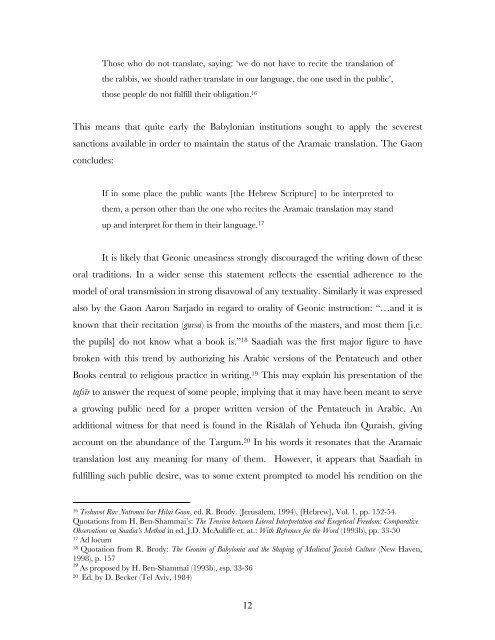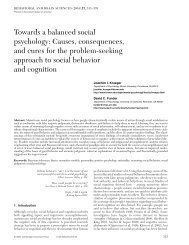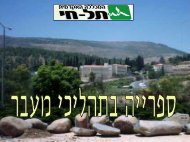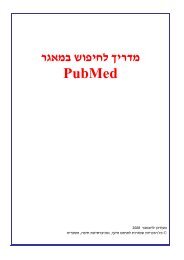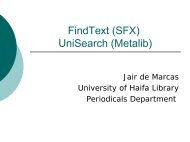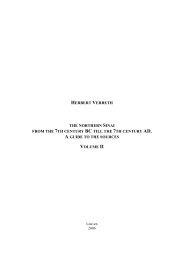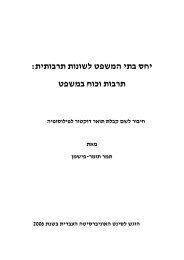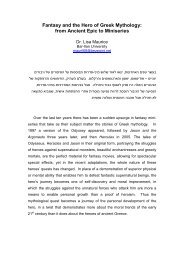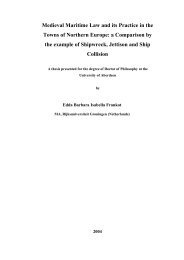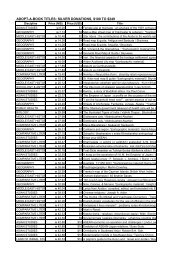The Transmission of the Judaeo-Arabic Pentateuch Translation of ...
The Transmission of the Judaeo-Arabic Pentateuch Translation of ...
The Transmission of the Judaeo-Arabic Pentateuch Translation of ...
Create successful ePaper yourself
Turn your PDF publications into a flip-book with our unique Google optimized e-Paper software.
Those who do not translate, saying: ‘we do not have to recite <strong>the</strong> translation <strong>of</strong><br />
<strong>the</strong> rabbis, we should ra<strong>the</strong>r translate in our language, <strong>the</strong> one used in <strong>the</strong> public’,<br />
those people do not fulfill <strong>the</strong>ir obligation. 16<br />
This means that quite early <strong>the</strong> Babylonian institutions sought to apply <strong>the</strong> severest<br />
sanctions available in order to maintain <strong>the</strong> status <strong>of</strong> <strong>the</strong> Aramaic translation. <strong>The</strong> Gaon<br />
concludes:<br />
If in some place <strong>the</strong> public wants [<strong>the</strong> Hebrew Scripture] to be interpreted to<br />
<strong>the</strong>m, a person o<strong>the</strong>r than <strong>the</strong> one who recites <strong>the</strong> Aramaic translation may stand<br />
up and interpret for <strong>the</strong>m in <strong>the</strong>ir language. 17<br />
It is likely that Geonic uneasiness strongly discouraged <strong>the</strong> writing down <strong>of</strong> <strong>the</strong>se<br />
oral traditions. In a wider sense this statement reflects <strong>the</strong> essential adherence to <strong>the</strong><br />
model <strong>of</strong> oral transmission in strong disavowal <strong>of</strong> any textuality. Similarly it was expressed<br />
also by <strong>the</strong> Gaon Aaron Sarjado in regard to orality <strong>of</strong> Geonic instruction: “…and it is<br />
known that <strong>the</strong>ir recitation (gursa) is from <strong>the</strong> mouths <strong>of</strong> <strong>the</strong> masters, and most <strong>the</strong>m [i.e.<br />
<strong>the</strong> pupils] do not know what a book is.” 18 Saadiah was <strong>the</strong> first major figure to have<br />
broken with this trend by authorizing his <strong>Arabic</strong> versions <strong>of</strong> <strong>the</strong> <strong>Pentateuch</strong> and o<strong>the</strong>r<br />
Books central to religious practice in writing. 19 This may explain his presentation <strong>of</strong> <strong>the</strong><br />
tafsīr to answer <strong>the</strong> request <strong>of</strong> some people, implying that it may have been meant to serve<br />
a growing public need for a proper written version <strong>of</strong> <strong>the</strong> <strong>Pentateuch</strong> in <strong>Arabic</strong>. An<br />
additional witness for that need is found in <strong>the</strong> Risālah <strong>of</strong> Yehuda ibn Quraish, giving<br />
account on <strong>the</strong> abundance <strong>of</strong> <strong>the</strong> Targum. 20 In his words it resonates that <strong>the</strong> Aramaic<br />
translation lost any meaning for many <strong>of</strong> <strong>the</strong>m. However, it appears that Saadiah in<br />
fulfilling such public desire, was to some extent prompted to model his rendition on <strong>the</strong><br />
16 Teshuvot Rav Natronai bar Hilai Gaon, ed. R. Brody. (Jerusalem, 1994), [Hebrew], Vol. 1, pp. 152-54.<br />
Quotations from H. Ben-Shammai’s: <strong>The</strong> Tension between Literal Interpretation and Exegetical Freedom: Comparative<br />
Observations on Saadia’s Method in ed. J.D. McAuliffe et. at.: With Refrenece for <strong>the</strong> Word (1993b), pp. 33-50<br />
17 Ad locum<br />
18 Quotation from R. Brody: <strong>The</strong> Geonim <strong>of</strong> Babylonia and <strong>the</strong> Shaping <strong>of</strong> Medieval Jewish Culture (New Haven,<br />
1998), p. 157<br />
19 As proposed by H. Ben-Shammai (1993b), esp. 33-36<br />
20 Ed. by D. Becker (Tel Aviv, 1984)<br />
12


